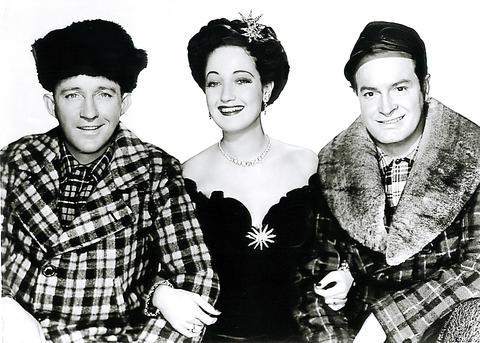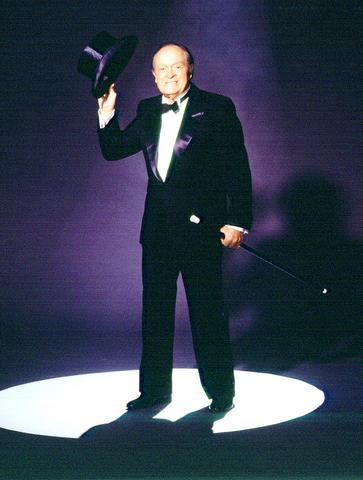Bob Hope's one-liners gently poked fun at presidents, blunted the sting of combat for American soldiers from World War II to the Gulf War, and ultimately made him the most revered of American comics.
Hope, who turned 100 on May 29, rode a genial wave of success in movies, radio and television to a position unique among entertainers. He died Sunday of pneumonia at his Los Angeles-area home, publicist Ward Grant said Monday. His family was at his bedside.

PHOTO: REUTERS
As the 20th century's good humor delivery man for US troops, Hope took his show on the road to bases, field hospitals, jungles and aircraft carriers around the world, peppering audiences with a fusillade of brief, topical gags.

PHOTO: AFP
Hope's humor lacked malice, and he made himself the butt of many jokes. His golf scores and physical attributes, including his celebrated ski-jump nose, were frequent subjects:
``I want to tell you, I was built like an athlete once -- big chest, hard stomach. Of course, that's all behind me now.''

``It's hard for me to imagine a world without Bob Hope in it,'' said filmmaker Woody Allen, who cited Hope's 1942 film Road to Morocco for pointing him toward comedy.
``The nation lost a great citizen,'' President George W. Bush said after hearing of the comedian's death.
The English-born Hope began in vaudeville and ended up conquering every medium. When Hope went into one of his monologues, it was almost as though the world was conditioned to respond. No matter that the joke was old or flat; he was Bob Hope and he got laughs.
``Audiences are my best friends,'' he liked to say. ``You never tire of talking with your best friends.''
Along with family members, Hope's longtime caregivers and a priest were present when he died.
``I can't tell you how beautiful and serene and peaceful it was,'' daughter Linda Hope told a news conference. ``The fact that there was a little audience gathered around, even though it was family, I think warmed dad's heart.''
``He really left us with a smile on his face and no last words. ... He gave us each a kiss and that was it,'' she said.
Hope earned a fortune, gave lavishly to charity and was showered with awards, so many that he had to rent a warehouse to store them.
Though he said he was afraid of flying, Hope traveled countless kilometers to boost the morale of American servicemen. He headlined in so many war zones that he had a standard joke for the times he was interrupted by gunfire: ``I wonder which one of my pictures they saw?''
So often was Hope away entertaining, and so little did he see his wife, Dolores, and their four children, that he once remarked, ``When I get home these days, my kids think I've been booked on a personal appearance tour.''
On his 100th birthday, he was too frail to take part in public celebrations, but was said to be alert and happy -- and overwhelmed by the outpouring of affection. The fabled intersection of Hollywood Boulevard and Vine Street was renamed Bob Hope Square, and Bush established the Bob Hope American Patriot Award.
``He can't believe that this is happening and that he's made it to his Big 100,'' son Kelly Hope said at the time.
Leslie Towns Hope was born in 1903 in Eltham, England, the fifth of seven sons of a British stonemason and a Welsh singer of light opera. The Hopes emigrated to the US when he was four and settled in Cleveland. They found themselves in the backwash of the 1907 depression.
The boy helped out by selling newspapers and working in a shoe store, a drug store and a meat market. He also worked as a caddy and developed a lifelong fondness for golf.
Hope changed his name to Bob when classmates ridiculed his English schoolboy name.
He boxed for a time under the name Packy East -- ``I was on more canvases than Picasso'' -- and tried a semester in college before devoting himself to show business. He quickly veered from song and dance to comedy patter, and his monologue routine was born.
By 1930, he had reached vaudeville's pinnacle -- The Palace -- and in the 1930s he played leading parts in Broadway musicals. During Roberta, he met nightclub singer Dolores Reade and invited her to the show. They married in 1934.
After a few guest radio spots, Hope began working regularly on a Bromo Seltzer radio program. In 1938, he was hired by Pepsodent to create his own show, and that led him to Hollywood.
Paramount signed him for The Big Broadcast of 1938, in which he introduced the song that became his trademark, Thanks for the Memory.
Soon he was teaming with Bing Crosby in the seven ``Road'' pictures -- Road to Bali, Road to Morocco, and so on -- playing best friends who lie, cheat and make fun of each other in comedic competition for glory and Dorothy Lamour.
In all, he made 53 films from 1938 to 1972. In 1950, he entered television, and his successes continued. He also appeared more than 20 times at the Academy Awards between 1939 and 1978.
Hope started playing to troops well before the US entered World War II. He tried to enlist, but was told he could be of more use as an entertainer. He played his first camp show in California in May 1941, seven months before Pearl Harbor.
His traditional Christmas tours began in 1948 in Berlin. His 1966 Vietnam Christmas show, when televised, was watched by an estimated 65 million people, the largest audience of his career. But his initially hawkish views on Vietnam opened a gap between the comedian and young Americans opposed to the war, who sometimes heckled him.
Hope's awards included scores of honorary degrees and awards, including the Medal of Freedom from President Lyndon Johnson and an honorary knighthood in England in 1998.
He was the author or co-author of 10 books, including his 1990 autobiography, Don't Shoot, It's Only Me.
In the mid-1990s, Hope played charity dates but slowed his schedule. In recent years, his hearing eroded, although he refused to wear a hearing aid. He suffered recurring eye problems, and in recent years was unable to communicate.
Until increasing frailty slowed him down, Hope repeatedly pledged never to quit entertaining.
``I'm not retiring until they carry me away,'' he said. ``And I'll have a few routines on the way to the big divot.''
Hope is survived by his wife, sons, daughters and four grandchildren.

May 26 to June 1 When the Qing Dynasty first took control over many parts of Taiwan in 1684, it roughly continued the Kingdom of Tungning’s administrative borders (see below), setting up one prefecture and three counties. The actual area of control covered today’s Chiayi, Tainan and Kaohsiung. The administrative center was in Taiwan Prefecture, in today’s Tainan. But as Han settlement expanded and due to rebellions and other international incidents, the administrative units became more complex. By the time Taiwan became a province of the Qing in 1887, there were three prefectures, eleven counties, three subprefectures and one directly-administered prefecture, with

Taiwan Power Co (Taipower, 台電) and the New Taipei City Government in May last year agreed to allow the activation of a spent fuel storage facility for the Jinshan Nuclear Power Plant in Shihmen District (石門). The deal ended eleven years of legal wrangling. According to the Taipower announcement, the city government engaged in repeated delays, failing to approve water and soil conservation plans. Taipower said at the time that plans for another dry storage facility for the Guosheng Nuclear Power Plant in New Taipei City’s Wanli District (萬里) remained stuck in legal limbo. Later that year an agreement was reached

What does the Taiwan People’s Party (TPP) in the Huang Kuo-chang (黃國昌) era stand for? What sets it apart from their allies, the Chinese Nationalist Party (KMT)? With some shifts in tone and emphasis, the KMT’s stances have not changed significantly since the late 2000s and the era of former president Ma Ying-jeou (馬英九). The Democratic Progressive Party’s (DPP) current platform formed in the mid-2010s under the guidance of Tsai Ing-wen (蔡英文), and current President William Lai (賴清德) campaigned on continuity. Though their ideological stances may be a bit stale, they have the advantage of being broadly understood by the voters.

In a high-rise office building in Taipei’s government district, the primary agency for maintaining links to Thailand’s 108 Yunnan villages — which are home to a population of around 200,000 descendants of the Chinese Nationalist Party (KMT) armies stranded in Thailand following the Chinese Civil War — is the Overseas Community Affairs Council (OCAC). Established in China in 1926, the OCAC was born of a mandate to support Chinese education, culture and economic development in far flung Chinese diaspora communities, which, especially in southeast Asia, had underwritten the military insurgencies against the Qing Dynasty that led to the founding of